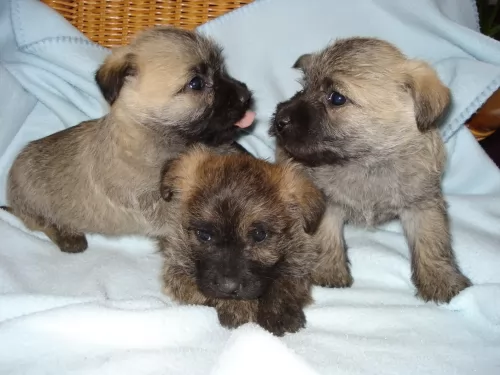 Petzlover
Petzlover Both Brug and Chiweenie are originated from United States. Brug may grow 11 cm / 5 inches higher than Chiweenie. Both Brug and Chiweenie are of same weight. Both Brug and Chiweenie has same life span. Both Brug and Chiweenie has same litter size. Both Brug and Chiweenie requires High Maintenance.
Both Brug and Chiweenie are originated from United States. Brug may grow 11 cm / 5 inches higher than Chiweenie. Both Brug and Chiweenie are of same weight. Both Brug and Chiweenie has same life span. Both Brug and Chiweenie has same litter size. Both Brug and Chiweenie requires High Maintenance.
 The Brug or Griffon Pug is not a purebred dog at this point in time. It is a cross between a Pug and a Brussels Griffon, currently known as a “designer dog” or a hybrid. This hybrid is really rare at this time but growing in popularity and breeders. Its exact history or original development is unknown at this time and needs to be researched as the hybrid develops into a breed, or breed clubs are formed. If you like either of the two breeds involved, you are sure to like the Brug. They are obviously not recognized by the major kennel clubs, but they are registered with a variety of hybrid/designer dog clubs. These include:
The Brug or Griffon Pug is not a purebred dog at this point in time. It is a cross between a Pug and a Brussels Griffon, currently known as a “designer dog” or a hybrid. This hybrid is really rare at this time but growing in popularity and breeders. Its exact history or original development is unknown at this time and needs to be researched as the hybrid develops into a breed, or breed clubs are formed. If you like either of the two breeds involved, you are sure to like the Brug. They are obviously not recognized by the major kennel clubs, but they are registered with a variety of hybrid/designer dog clubs. These include:
 The Chiweenie is a small dog developed in the 1960’s as a hybrid/cross between the Dachshund and the Chihuahua. Due to their small size and big personalities, they are an extremely popular designer breed. They are easy to care for and their personality and activity level is much like the Chihuahua side of the hybrid. The Chiweenie can look like either of its parents if it is first generation. If it is second or third generation it is likely to resemble the parents more as they already look like one of the two breeds. The second and third generations will look like the mix more than either of the originators.
The Chiweenie is a small dog developed in the 1960’s as a hybrid/cross between the Dachshund and the Chihuahua. Due to their small size and big personalities, they are an extremely popular designer breed. They are easy to care for and their personality and activity level is much like the Chihuahua side of the hybrid. The Chiweenie can look like either of its parents if it is first generation. If it is second or third generation it is likely to resemble the parents more as they already look like one of the two breeds. The second and third generations will look like the mix more than either of the originators.
The Chihuahua is the smallest breed of dog in the world and they originated in Mexico. The Daschund is a hunting dog from Germany with a long body and short legs. The Chiweenie is a nice looking cross breed that loves people and is very affectionate. They were developed in the United States.
 Like its two parental breeds, the Brug is a smaller sized dog – both parents are lab dogs and so is the Brug. Because they are hybrids, Brugs can be very different in appearance but most seem to have large eyes, squishy faces, black masks, fluffy hair, long black whiskers, short fluffy hair, flat ears and a fluffy tail. They could be in any of a number of colors including fawn, black, cream or apricot.
Like its two parental breeds, the Brug is a smaller sized dog – both parents are lab dogs and so is the Brug. Because they are hybrids, Brugs can be very different in appearance but most seem to have large eyes, squishy faces, black masks, fluffy hair, long black whiskers, short fluffy hair, flat ears and a fluffy tail. They could be in any of a number of colors including fawn, black, cream or apricot.
 A first-generation Chiweenie can look like either of the breeds they are crossed with. However, the second and third generations will have the hybrid look for the most part. No two will look exactly alike however. They have a thin snout that is long on a small, domed head. They can have floppy or pointed ears, eyes that are large and expressive, a moderate tail and small feet. They can vary substantially in their appearances.
A first-generation Chiweenie can look like either of the breeds they are crossed with. However, the second and third generations will have the hybrid look for the most part. No two will look exactly alike however. They have a thin snout that is long on a small, domed head. They can have floppy or pointed ears, eyes that are large and expressive, a moderate tail and small feet. They can vary substantially in their appearances.
 This hybrid is a loyal little dog. They are an affectionate lap dog that wants to be with his humans all the time. They have a very pleasant disposition and do well with children and other dogs. They might be shy to begin with but will warm up to affection. However, they are willful and self-important at times. This is tempered by their great sense of humor and empathy to its peoples’ moods. Left alone too long, they will tend to bark excessively.
This hybrid is a loyal little dog. They are an affectionate lap dog that wants to be with his humans all the time. They have a very pleasant disposition and do well with children and other dogs. They might be shy to begin with but will warm up to affection. However, they are willful and self-important at times. This is tempered by their great sense of humor and empathy to its peoples’ moods. Left alone too long, they will tend to bark excessively.
 This is an extremely popular hybrid or designer dog because they are so friendly, gentle, loving lapdogs. In addition, they love to play and cuddle. They are great for single or older people. If they live with a family it should be with older kids because younger kids might hurt them. Be careful how rough you play. They are small and can be hurt easily.
This is an extremely popular hybrid or designer dog because they are so friendly, gentle, loving lapdogs. In addition, they love to play and cuddle. They are great for single or older people. If they live with a family it should be with older kids because younger kids might hurt them. Be careful how rough you play. They are small and can be hurt easily.
The Chiweenie is dedicated to their people and extremely loyal. They are also very cautious and can be nervous. They are always watching what else is happening in their environment and they will bark to alert you if they think there is something or someone out of place. They are not quiet dogs. They are great with other small dogs that they are raised with or used to but not with larger dogs, cats or other animals. They are jealous and protective. Train them out of or to avoid resource guarding. They can be stubborn about these things.
They will play constantly if you let them and they are great travel companions, although noises and activity around them does often annoy them. They are also courageous, clever, lovable and happy. Like most toy or small dog breeds you might have a difficult time housebreaking them and crate training is recommended.
 Usually the hybrid dog can have better health than either of the parents. This is true with the Brug as well, but there are also some issues they may inherit from the parents or face simply because of their size and complexion. These include:
Usually the hybrid dog can have better health than either of the parents. This is true with the Brug as well, but there are also some issues they may inherit from the parents or face simply because of their size and complexion. These include:
 Chiweenies are a pretty healthy crossbreed with their most prominent issue being allergies. At the same time this hybrid might inherit any of the problems of either of their two parental breeds. These conditions might include:
Chiweenies are a pretty healthy crossbreed with their most prominent issue being allergies. At the same time this hybrid might inherit any of the problems of either of their two parental breeds. These conditions might include:
The tendency for this would come from the Chihuahua parental genes and can result in brain damage but normally is not that bad.
The tendency for this would come from the Dachshund parental genes and if your Chiweenie has a long back you will need to be careful of jump and overzealous playing.
 Don’t let this dog get overweight. Feed a high quality dry food intended for small or toy dogs. One fourth to one half of a cup per day in two separate meals is what is recommended.
Don’t let this dog get overweight. Feed a high quality dry food intended for small or toy dogs. One fourth to one half of a cup per day in two separate meals is what is recommended.
Patella Luxation or slipped knee caps – small dogs often have this issue. The patella is the knee cap and layman often called it a slipped knee cap, but it is also called slipped stifles. The femur, the tibia and the patella do not line up and this causes an abnormal gait or even lameness. Puppies are born with this, but it does not exhibit symptoms until years later. Arthritis is the most common result. Occasionally surgery is required.
Eye Issues – Cherry eye, a genetic disease, as well as irritation from air borne particles, allergies or scratches.
Skin Allergies – They can have skin allergies so watch for excessive licking or scratching.
Breathing Issues – Asthma and respiratory issues are common among small dogs with these types of faces.
Like their 2 breed parents, the Brug is a small but energetic hybrid. They need to play and run on a daily basis. Leash walks are good, but they need a yard or dog park as well. They are athletic little dogs and are good at tracking, obedience and agility. You cannot force them to do an activity but if its fun they will jump right in.
 Chiweenies regulate their own food intake, even as puppies. They should be fed twice a day and they are prone to dental issues. Dry food is absolutely recommended.
Chiweenies regulate their own food intake, even as puppies. They should be fed twice a day and they are prone to dental issues. Dry food is absolutely recommended.
In addition to the conditions listed above, the Chiweenie might inherit the issues that affect small dogs most often. This includes:
A sudden drop in blood sugar levels. This can happen if the dog has diabetes and it is unregulated or stress and poor nutrition can also cause it.
These are little dogs with a lot of energy and they burn up a lot of energy. They need to walk every day or have a full-blown play session in the house. They don’t need much space to play in.